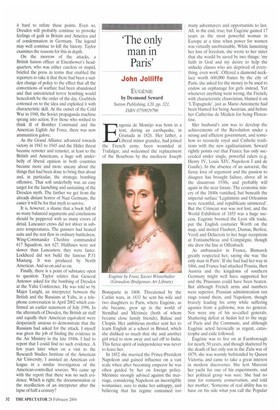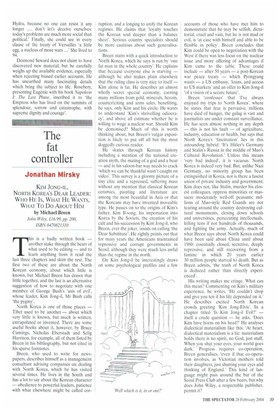'The only man in Paris'
John Jolliffe
EUGENIE by Desmond Seward Sutton Publishing £20, pp. 321, ISBN 0750929790 Fil, ugenia de Montijo was born in a tent, during an earthquake, in Granada in 1826. Her father, a j
Liberal minor grandee, had joined the French army, been wounded at Trafalgar, and welcomed the replacement of the Bourbons by the mediocre Joseph Bonaparte in 1808. Threatened by the Carlist wars, in 1833 he sent his wife and two daughters to Paris, where Eugenie, as she became, grew up in the world of Stendhal and Merimee (both of whom became close family friends), Balzac and Chopin. Her ambitious mother sent her to learn English at a school in Bristol, which she disliked so much that she and another girl tried to stow away and sail off to India. This fierce spirit of independence was never to leave her.
In 1852 she married the Prince-President Napoleon and gained influence on a vast scale when after becoming emperor he was often guided by her on foreign policy. Merimee strongly advised against the marriage, considering Napoleon an incorrigible womaniser, sure to make her unhappy, and believing that his regime contained too many adventurers and opportunists to last. All, in the end, true; but Eugenie gained 17 years as the most powerful woman in Europe at a time when power for women was virtually unobtainable. While lamenting her loss of freedom, she wrote to her sister that she would be saved by two things: 'my faith in God and my desire to help the unlucky classes who are deprived of everything, even work'. Offered a diamond necklace worth 600,000 francs by the city of Paris, she asked for the money to be used to endow an orphanage for girls instead. Yet whenever anything went wrong, the French, with characteristic chauvinism, blamed it on l'Espagnole', just as Marie-Antoinette had been blamed for being Austrian, and before her Catherine de Medicis for being Florentine.
Her husband's aim was to develop the achievements of the Revolution under a strong and efficient government, and somehow to reconcile royal and Catholic traditions with the new egalitarianism. Seward rightly points out that France has only succeeded under single, powerful rulers (e.g. Henry IV, Louis XIV, Napoleon I and de Gaulle). In the absence of an autocrat, the fierce love of argument and the passion to disagree has brought failure, above all in the disastrous 1930s, and probably will again in the near future. The economic misery of the 1840s vanished, but beneath the imperial surface 'Legitimists and Orleanists were resentful, and republicans simmered'. But the Crimean war was not lost, and the World Exhibition of 1855 was a huge success. Eugenie boosted the Lyon silk trade, put the English couturier Worth on the map, and invited Flaubert, Dumas, Berlioz, Verdi and Delacroix to her huge receptions at Fontainebleau and Compiegne, though she drew the line at Offenbach.
As ambassador in France, Bismarck greatly respected her, saying she was 'the only man in Paris'. If she had had her way in 1866, and France had attacked Prussia, then Austria and the kingdoms of southern Germany might well have supported her and the Prussians could have been beaten. But although French arms and numbers were superior, Prussian administration ran rings round them, and Napoleon, though bravely leading his army while suffering agonies from a gallstone, was no general. Nor were any of his so-called generals. Shattering defeat at Sedan led to the siege of Paris and the Commune, and although Eugenie acted heroically as regent, catastrophe and exile followed.
Eugenie was to live on at Farnborough for nearly 50 years, and though shattered by the death of her only son in the Zulu war of 1879, she was warmly befriended by Queen Victoria, and came to take a great interest in modern discoveries. She lent Marconi her yacht for one of his experiments, and her political grasp was sure. She had no time for romantic conservatism, and told her mother, 'Someone of real ability has to have on his side what you call the Popular Hydra, because no one can resist it any longer .... don't let's deceive ourselves: today's problems are much more social than political' Finally, she could see in every clause of the treaty of Versailles 'a little egg, a nucleus of more wars ...' She lived to 94.
Desmond Seward does not claim to have discovered new material, but he carefully weighs up the available evidence, especially when rejecting biased earlier accounts. He has unearthed many fascinating details which bring the subject to life. Rosebery, presenting Eugenie with his book Napoleon I: The Last Phase, inscribed it to 'the Empress who has lived on the summits of splendour, sorrow and catastrophe, with supreme dignity and courage'.



























































 Previous page
Previous page